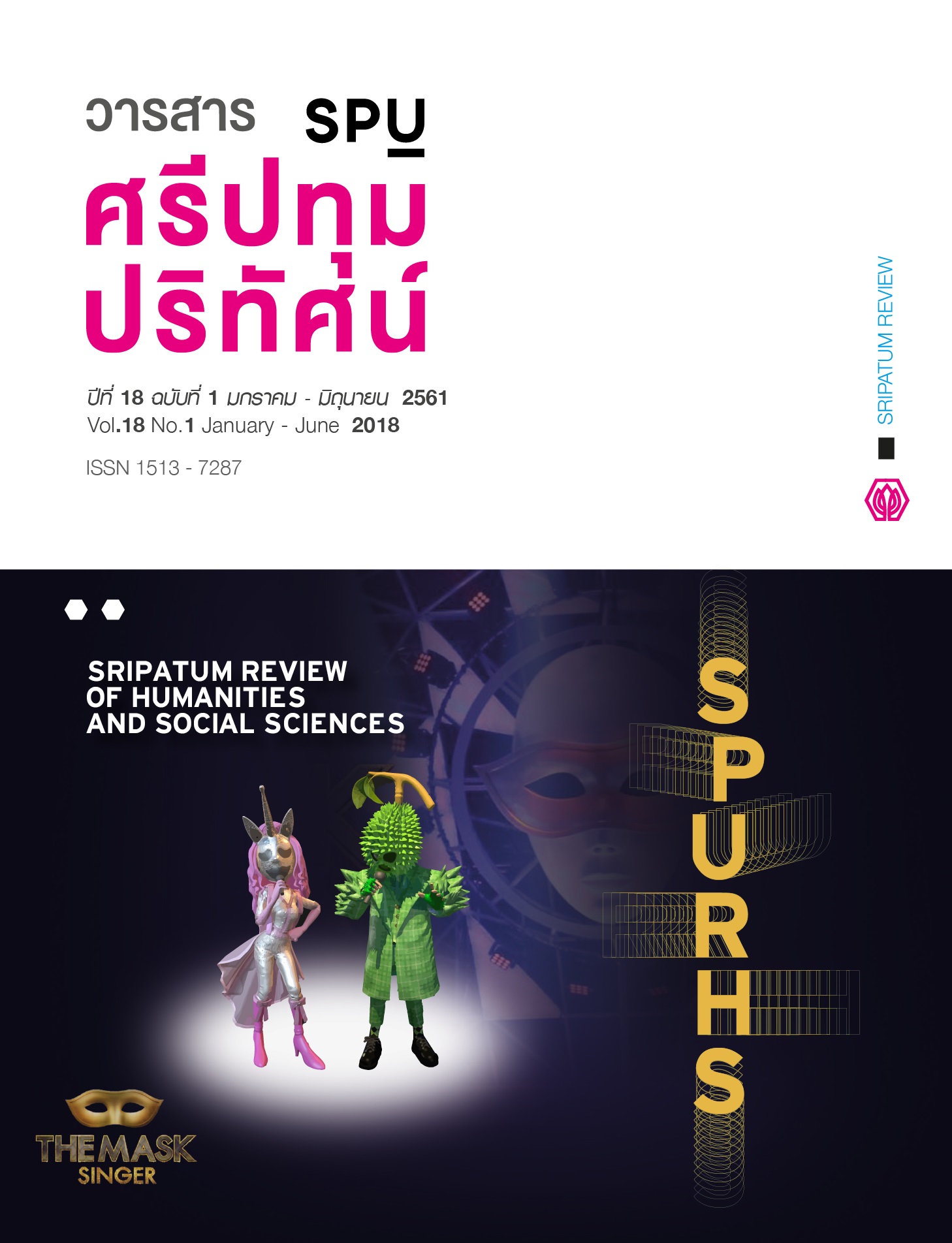TOURISM AND ITS IMPACTS TO THE SOCIOCULTURAL CHANGES: A CASE STUDY OF THE KHAOSAN ROAD, BANGKOK
Main Article Content
Abstract
This article is an attempt to study the impacts of tourism on the local community and cultural values in Khaosan Road exploring both positive and negative tourism impacts as well as the physical influences causing social stress in the area for readers who are interested in tourism and its contribution to the sociocultural changes in order to call attention to the awareness of people towards the following issue.
Khaosan Road, a street in central Bangkok by Chaophraya River at the northern side of Rattanakosin Area, translates as "milled rice road" and is an attribution to the historical role of this street in the rice trade. For past two centuries the street was a quiet residential area with the local population. After tourism becomes popular, the tourists looked for accommodations, the very first business was a small hotel serving the civil servants from other provinces. The guest house business generated profit and motivated locals to turn their houses to small inns and taverns. The increasing numbers of backpackers since then have affected the socio-culture and physical environment of the Khaosan Road. Direct and indirect relations with tourists and interaction with the tourism industry has brought changes in value systems and behavior of the local community.
Article Details
1. กองบรรณาธิการสงวนสิทธิ์ในการพิจารณาและตัดสินการตีพิมพ์บทความในวารสาร
2. บทความทุกเรื่องจะได้รับการตรวจสอบทางวิชาการโดยผู้ทรงคุณวุฒิ แต่ข้อความและเนื้อหาในบทความที่ตีพิมพ์เป็นความรับผิดชอบของผู้เขียนแต่เพียงผู้เดียว มิใช่ความคิดเห็นและความรับผิดชอบของมหาวิทยาลัยศรีปทุม
3. การคัดลอกอ้างอิงต้องดำเนินการตามการปฏิบัติในหมู่นักวิชาการโดยทั่วไป และสอดคล้องกับกฎหมายที่เกี่ยวข้อง
References
Cole, S. 2007. Beyond Authenticity and Commodification. Annals of Tourism Research. 34(4), 943-960.
Cooper, C., Fletcher, J., Fyall, A., Gilbert, D., and Wabhill, S. 2008. Tourism Principles and Practice. 4th ed.Essex: Pearson.
Dluzenwska. 2008. The influence of Religion on Global and Local Conflict in Tourism: Case Studies in Muslim Countries. Tourism Development: Growth, Myths and Inequalities, 52-67.
Fainstein, S. S. 2007. Tourism and the Commodification of Urban Culture. The Urban Reinventors. Retreived October 27, 2016.
Fiaux, N. 2010 Culture for Sale! Commoditization in Tourism. Retrieved April 26, 2017 .
Glasson, J. Godfrey, K. and Goodey, B. 1995. Towards Visitor Impact Management; Visitor Impacts, Carrying Capacity and Management Responses in Europe's Historic Towns and Cities. Aldershot: Avebury.
Kevin, K. 2017. The History of Khao Sam Road. Retrieved June 28, 2017 .
Mykura, C. 2017. 7 Movie Locations in Bangkok Films made in Bangkok. Retrieved June 28, 2017 .
Office of the Permanent Secretary. 2017. Tourism economic review. Bangkok: Ministry of Tourism and Sports.
One Stop Bangkok. 2017. Khao San Road – Backpacker Guide. Retrieved June 28, 2017.
Oppermann, M. and Chon, K.S. 1997. Tourism in Developing Countries. London: International Thomson Business.
OSAC. 2016. Thailand 2016 Crime & Safety Report: Bangkok. Retrieved March 20, 2017 .
Reiginger, Y. & Turner, L. W. 2003. Cross-Cultural Behaviour in Tourism. Oxford: Butterworth-Heinemann.
Simm, C. 2017. Positive & Negative Effects of Tourism. Retrieved June 28, 2017.
Smith, S.L.J. 1995. Tourism Analysis: A Handbook. 2nd ed. Harlow: Longman.
Suksam, T. 2014. Problems and Obstacles of the Development of Khaosan Road. Retrieved June 28, 2017.
UKessays. 2017. Socio-Cultural Impact of Tourism. Retrieved July 7, 2017 .
UNEP. 2016. Socio-cultural impacts of tourism. Retrieved March 20, 2017 .
UNESCO. 2017. Tourism Resources. Retrieved June 28, 2017 .
Wirth, R. and Freestone, R. 2003. Tourism, Heritage and Authenticity: State-Assisted Cultural Commodification in Suburban Sydney, Australia. Retrieved October 27, 2010 .


